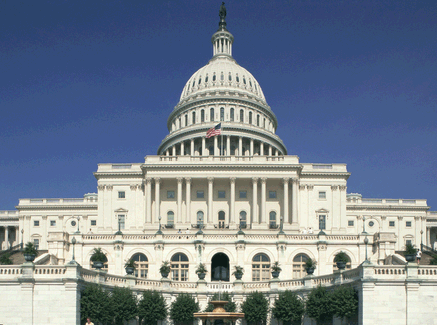Last week the House approved a budget resolution and passed the first two spending bills. The Transportation-HUD spending measure was also approved by the subcommittee while the Legislative Branch spending measure passed the full House Appropriations Committee.
By a vote of 226-197 the House adopted the FY2016 budget resolution (S. Con. Res. 11) on Thursday. The plan reflects the statutory caps on discretionary spending, $523 billion for defense and $493.5 billion for non-defense spending; it also includes $96 billion for defense spending in the Overseas Contingency Operations fund. The language in the budget resolution reserves budget reconciliation only to partially repeal or make changes to the Affordable Care Act, as included in the Senate version (the House version had included additional options to make cuts to various mandatory spending programs). The resolution assumes a balanced budget by FY2024, with $5.3 trillion in spending cuts over 10 years, 80 percent of which comes from mandatory programs (e.g., Medicare and Medicaid). This is not a bill and therefore does not go to the President for his signature; it is instead enforced through House and Senate rules. For a summary explanation of Congressional budget resolutions and the reconciliation process, click here.
The House also approved the first two FY2016 spending bills. The $76.1 billion Military Construction – Veterans Affairs measure (HR 2029) passed the House by a vote of 255-163, the narrowest margin for this typically noncontroversial spending bill in recent memory. There were approximately two dozen amendments adopted, while three amendments were defeated that would have eliminated $532 million in Military Construction related funding from the Overseas Contingency Operations fund. Most Democrats voted against the measure, citing adherence to the sequestration limits as the reason for their opposition, and the White House has indicated the President will veto the measure if it gets to his desk, releasing a Statement of Administration Policy outlining the concerns.
On Friday the House approved the Energy – Water spending measure (HR 2028) by a vote of 240-177. The $35.4 billion measure garnered objections from many Democrats, citing policy riders and adherence to sequestration amounts. The policy riders include barring the administration from implementing its National Oceans Policy and permanently blocking the White House from moving forward on a clean water bill. The White House also issued a Statement of Administration Policy for this measure, again indicating a likely presidential veto.
The House Appropriations Transportation-Housing and Urban Development (HUD) subcommittee approved a FY2016 spending measure, with $55.27 billion in discretionary spending for infrastructure and housing programs. This is up $1.5 billion from the current level, but $9.7 billion below the President’s request. Many Democrats objected to policy riders in the spending measure, including provisions that would allow longer double trailers on highways and continued efforts to stall enforcement of rules related to rest periods for truckers. Finally, the House Appropriations Committee approved the Legislative Branch spending measure on a voice vote; the $3.3 billion measure is $172.3 million below the President’s request. The House Majority Leader indicates the House will take up this measure sometime in May.
The House is in recess this week, and will be back in session on Tuesday, May 12. The Senate is scheduled to vote today on the conferenced budget resolution, S. Con. Res. 11 after the House passed the resolution last week by a vote of 226 to 197. The resolution requires a majority vote in the Senate. After consideration of the budget resolution, the Senate is expected to turn to consideration of the Iran nuclear bill (S. 615), followed possibly by consideration of the trade legislation (S. 995).


